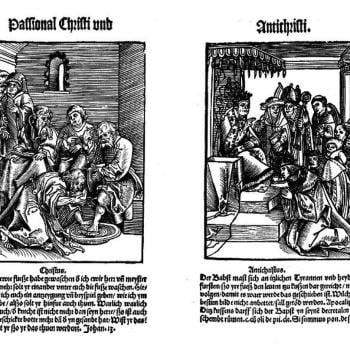This year Ash Wednesday falls on St. Valentine’s Day. So do we have romantic dinners, or fast? Should we make sure our loved one isn’t giving up chocolate for Lent before giving a box of chocolates? I will not presume to give definitive answers to these or related questions.
Instead, I will draw your attention to what the Lutheran confessions say about Lent and its customs, showing why we observe these allegedly “Catholic” practices, but also how we observe them differently from the way the medieval Catholics did (my bolds):
Article XV of the Augsburg Confession. Of Ecclesiastical Usages:
Of Usages in the Church they teach that those ought to be observed which may be observed without sin, and which are profitable unto tranquillity and good order in the Church, as particular holy days, festivals, and the like.
Nevertheless, concerning such things men are admonished that consciences are not to be burdened, as though such observance was necessary to salvation.
They are admonished also that human traditions instituted to propitiate God, to merit grace, and to make satisfaction for sins, are opposed to the Gospel and the doctrine of faith. Wherefore vows and traditions concerning meats and days, etc., instituted to merit grace and to make satisfaction for sins, are useless and contrary to the Gospel.
Emperor Charlemagne enforced the death penalty for anyone who ate meat during Lent. In the Middle Ages, butchers were forbidden by law to sell meat during Lent. And during the Reformation, it was a good way for Catholic rulers to suss out Protestants by seeing who refused to fast during the leadup to Easter.
The Lutherans, unlike the Reformed, retained “holy days, festivals, and the like.” But not as a way to merit grace and make satisfaction for sins, as they were often treated in medieval Catholicism.
Notice the emphasis on Christian liberty in the Gospel: “Consciences are not to be burdened.”
I had a friend growing up who was a Catholic, back before the loosening of standards that came with Vatican II. We were on a Boy Scout campout. For breakfast, we fixed bacon over a campfire. My friend was enjoying it, but then he had a shocked expression. “This is Friday!” he said. “I ate bacon!” Back then, Catholics were to fast from meat on Fridays. Post-Vatican II, they don’t have to do that every week, but they are still supposed to during Lent. My friend’s conscience was severely burdened.
On that principle, I suppose that you could have a romantic dinner and eat chocolates and other Valentine’s Day activities. You aren’t sinning if you aren’t fasting. Nor are you gaining merit before God is you are. Doing so or not doing so is a matter of Christian liberty and you should not let your decision burden your conscience.
The Augsburg Confession has much more to say about fasting. Article XXVI. Of the Distinction of Meats goes into that in great detail, emphasizing how we must never base our salvation on our works. (As far as the “distinction of meats,” I remember a controversy among Catholics in New Orleans about whether alligator should be classified as a “fish,” and thus acceptable to eat on Ash Wednesday and Fridays in Lent. As I recall, it was.)
This is a really long one, unlike most of the Augsburg articles, so I will just give you the last part, which gives another reason for fasting, self-denial, and mortification of the flesh. Not because doing such things make us righteous before God. But because practice in saying “no” to ourselves is good for us!
From Article XXVI. Of the Distinction of Meats:
Here our adversaries object that our teachers are opposed to discipline and mortification of the flesh, as Jovinian. But the contrary may be learned from the writings of our teachers. For they have always taught concerning the cross that it behooves Christians to bear afflictions. This is the true, earnest, and unfeigned mortification, to wit, to be exercised with divers afflictions, and to be crucified with Christ.
Moreover, they teach that every Christian ought to train and subdue himself with bodily restraints, or bodily exercises and labors that neither satiety nor slothfulness tempt him to sin, but not that we may merit grace or make satisfaction for sins by such exercises. And such external discipline ought to be urged at all times, not only on a few and set days. (30-33)
Finally, here is the perfect Valentine for Ash Wednesday, Luther’s Seal, which brings together the red heart and the black Cross:
I shall answer most amiably and tell you my original thoughts and reason about why my seal is a symbol of my theology. The first should be a black cross in a heart, which retains its natural color, so that I myself would be reminded that faith in the Crucified saves us. “For one who believes from the heart will be justified” (Romans 10:10). Although it is indeed a black cross, which mortifies and which should also cause pain, it leaves the heart in its natural colour. It does not corrupt nature, that is, it does not kill but keeps alive. [Keep reading. . .]
Illustration: Luther’s Seal, by I, Daniel Csörföly (from Budapest, Hungary), CC BY-SA 3.0, https://commons.wikimedia.org/w/index.php?curid=284225














